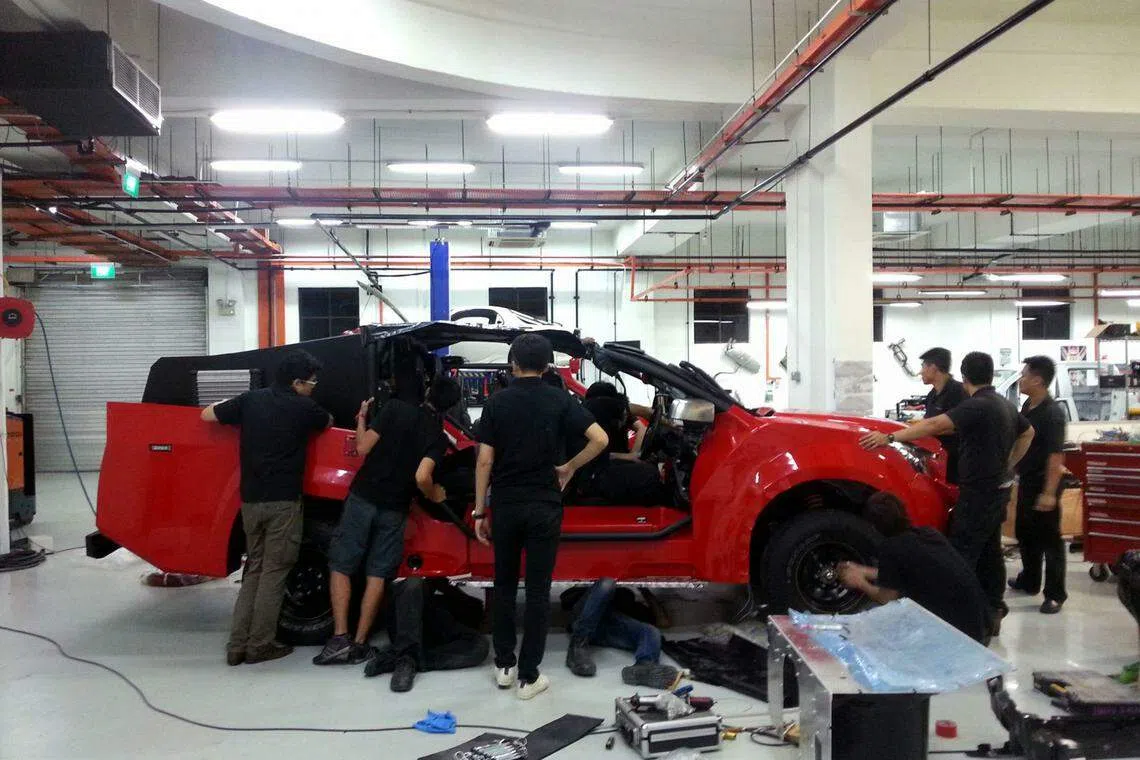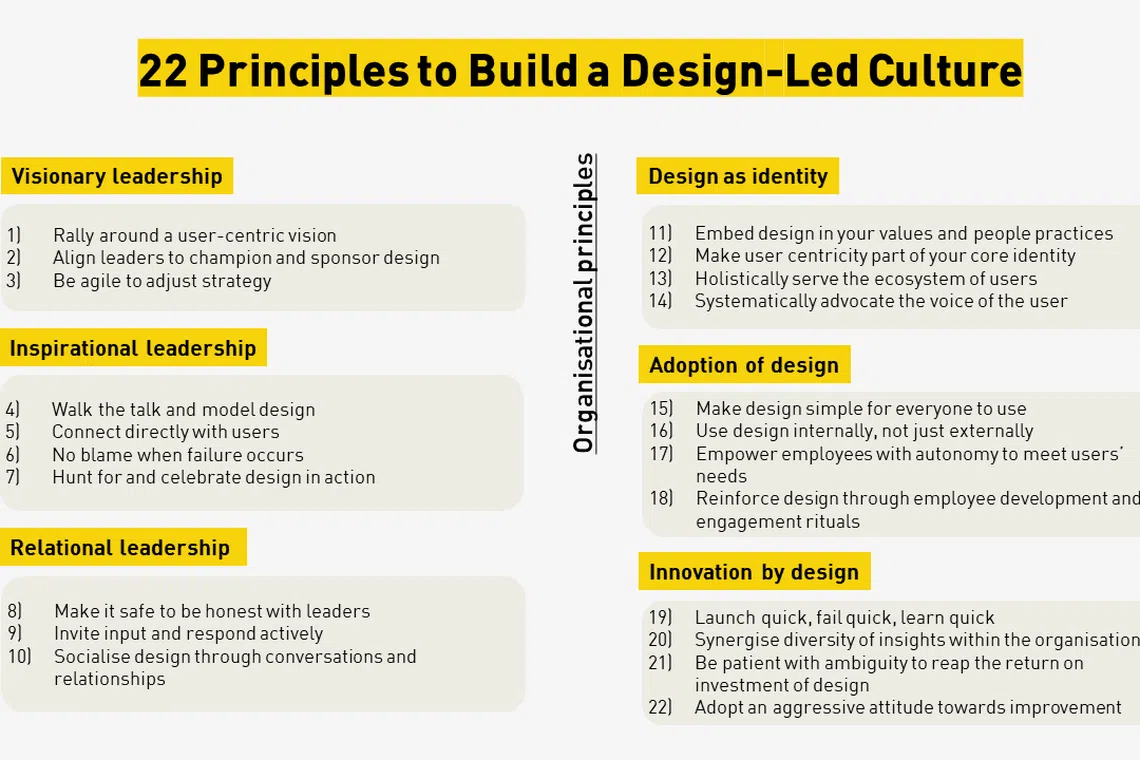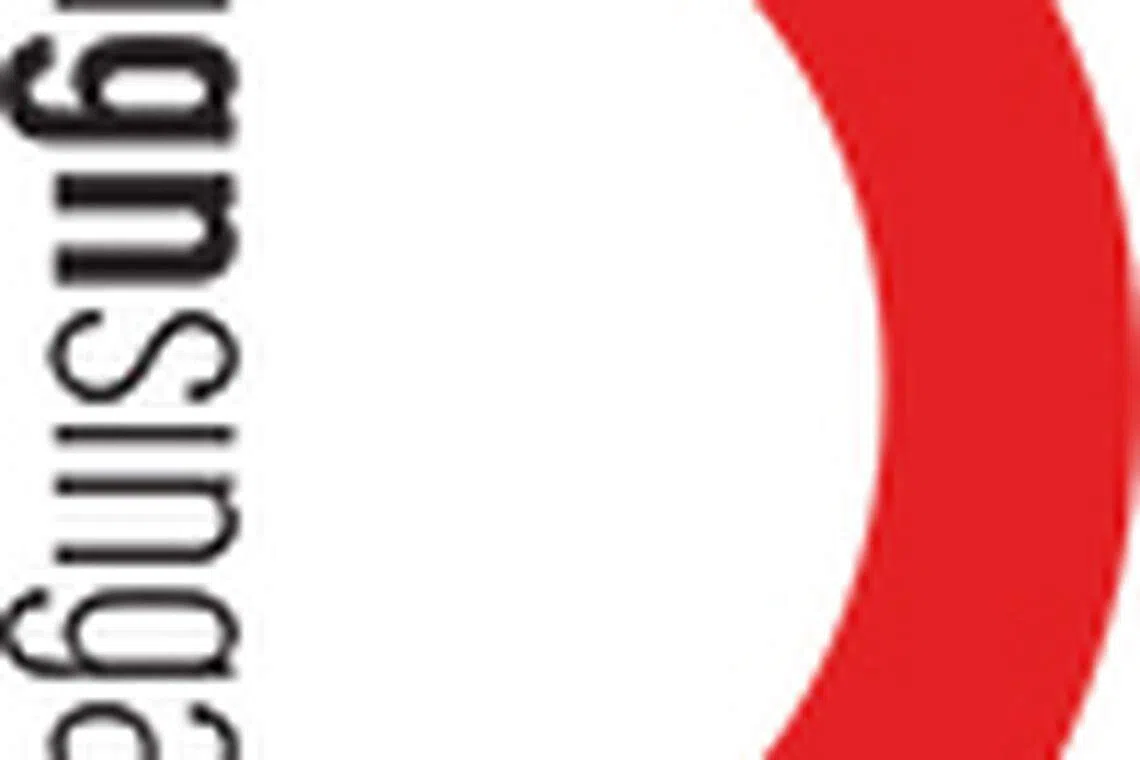The secret to how some Singapore businesses are thriving in today's volatile environment
Sustainable innovation requires cultural transformation. The "It's All About Culture: Better Businesses by Design" Playbook surfaces organisational cultural principles that help businesses flourish as they design cutting-edge, relevant products, services and experiences
For businesses to survive and still be sustainable, let alone grow, they need to constantly innovate and review their strategies. This requires a shift at a cultural level - and that is where design can come into play as a core guiding principle of the organisation.
Home-grown digital solutions design company, Aleph Labs, considers itself a boutique company, but it is the brains within the team that has changed the way many Singaporeans bank.
In 2015, it developed an all-in-one banking application, which allows Android smartphone users to pay for purchases by tapping their smartphones, for a Regional Bank.
Today, Aleph Labs continues to collaborate and helps with the design of an entire suite of products, including the bank's internet, digital, wealth and corporate banking systems.
Even though it operates with a medium-sized team of 450 across seven countries in Asia Pacific, Aleph Labs uses its staff strength to its advantage.
"It's easier for us to adopt design culture as a small and medium-sized company," says Mr Poon Wen Ang, Design Director & Chief Opportunity Officer of Aleph Labs. "It starts with knowing what you want to achieve," he adds. "It should then involve a strategic, phased approach, whether it's digitising your brand, going global, or acquiring and retaining talent."
Navigate Asia in
a new global order
Get the insights delivered to your inbox.
One way in which Mr Poon and his team found success is by adopting a design thinking principle of "being patient with ambiguity to reap the return on investment of design". To continue to gain trust, Aleph Labs had to patiently build relationships over the years, relentlessly pursuing conversations and making small advances before it could move on to larger goals. Today, both sides are exploring and collaborating on new areas such as artificial intelligence and machine learning. Aleph Labs is one of 10 companies featured as case studies in the newly released Design-Led Culture Study Playbook, titled "It's All About Culture: Better Businesses by Design", a collaboration between DesignSingapore Council (Dsg) and ROHEI Learning & Consulting.
Launched on 22 November, the Playbook examines and studies the culture of design-led organisations and uncovers the key strategies, or "recipes for success" involved in developing it. Close to 50 in-depth interviews were conducted with senior management personnel from 27 diverse, design-led organisations, including family-run small and medium-sized enterprises (SMEs), large local enterprises, international conglomerates and government agencies.
The insights gleaned from this year-long study culminated in 22 principles for building a design-led culture. These can be applied to any organisation, regardless of its industry or size.
Taking a human-centred approach to ignite home-grown innovation
Design thinking is essentially the approach of using various tools to solve problems creatively. It is also a continuous iterative process that focuses on the users and their evolving needs, taking a human-centred approach to innovation.
Design-led companies never rest on their laurels. Instead, they are constantly experimenting with new ideas and processes in order to create innovative, relevant solutions. Nurturing design thinking and building design-led culture in an organisation calls for a change in mindsets and a willingness to embrace a new set of values.
A 2018 McKinsey study of over 300 international organisations found that firms that were design-led recorded two times as much growth in revenue and returns when compared to their industry's benchmark.

With the Playbook, Dsg hopes to share the success stories of companies to inspire others, as well as to recommend steps that human resource professionals, senior management and employees within organisations can take to implement design principles at work.
"This Playbook is a good reference for Singapore-based companies as they can make comparisons easily because many of the examples are locally based, and the approaches taken are all in line with the local market," says Mr Daniel Nia, Deputy Chief Executive Officer of HOPE Technik.
The home-grown engineering company develops high-tech solutions for customers from a wide range of industries, like aerospace, defence and robotics, and its high-profile projects include the Red Rhinos, the Singapore Civil Defence Force's light firefighting vehicles. It advocates one of the design thinking principles outlined in the Playbook, "no blame when failure occurs", which focuses on finding solutions to errors in specifically-designed meetings known as "War Rooms" - without any finger-pointing. During these meetings, staff from different departments and levels of seniority come together to discuss how to prevent or rectify faults, and are provided a safe space to voice their opinions.
Another SME featured in the Playbook is iHub Solutions, a smart warehouse and logistics services provider in Singapore and the wider Southeast Asian region. It has greatly benefited from the design principle "holistically serve the ecosystem of users". It looks far beyond just the delivery process and designs solutions that help its clients achieve optimal efficiency throughout the entire supply chain.
For example, iHub Solutions handles the logistics for New Zealand-based nut supplier Alison's Pantry, storing the products in warehouses and distributing them to 55 supermarkets in Singapore. Knowing that customers like the nuts to be as crisp and fresh as possible, iHub Solutions set up specialised spring gauges in the supermarkets; the devices would trigger an alert in its systems when the amount of nuts in a particular store drops below a certain weight. This allows iHub Solutions to ensure that the nuts are restocked on-demand with the precise amounts required, thereby reducing waste and ensuring maximum freshness for Alison's Pantry's customers.

When the pandemic hit last year, iHub Solutions quickly developed a contactless solution when it observed that customers were wary of high-touch surfaces. Instead of having to sign on a delivery personnel's tablet, customers would receive a link through which they could sign delivery receipts on their smartphones. They could also sign on their mobile devices by scanning a QR code from the delivery personnel's tablet.
Mr Koh San Joo, iHub Solutions' Founder and Managing Director, says it is important that companies think of the final outcome they want and "work backwards from that". "Whether it's banking or logistics or insurance, everyone 'serves customers'", says Mr Koh, "but using deliberate design thinking will help you stand out."
"It's All About Culture: Better Businesses by Design" examines the culture of design-led organisations and uncovers the key strategies involved in developing it. The Playbook outlines 22 principles for building a design-led culture, which are grouped into six broad categories.

Companies are encouraged to first complete the Design-Led Culture Survey (featured in the Playbook), to uncover their areas of strength and those they can improve on before reading more about the principles, recommendations and case studies to find out how they can better build a design-led culture.
Download the Design-Led Culture Study Playbook here.

Decoding Asia newsletter: your guide to navigating Asia in a new global order. Sign up here to get Decoding Asia newsletter. Delivered to your inbox. Free.
Copyright SPH Media. All rights reserved.

